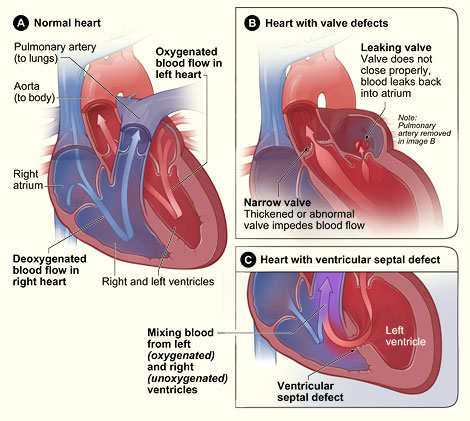What Causes a Heart Murmur?
Innocent Heart Murmurs
Innocent heart murmurs are sounds heard when blood
flows through a normal heart. These murmurs may occur when blood flows faster
than normal through the heart and its attached blood vessels. Illnesses or
conditions that may cause this to happen include fever,
anemia
(uh-NEE-me-eh), and hyperthyroidism (too much thyroid hormone in the body).
Extra blood flow through the heart also may cause
innocent heart murmurs. After childhood, the most common cause of extra blood
flow through the heart is pregnancy. Most heart murmurs found in pregnant women
are innocent. They’re due to the extra blood that women's bodies make
while they’re pregnant.
Changes to the heart that result from
heart
surgery or aging also may cause some innocent heart murmurs.
Abnormal Heart Murmurs
The most common cause of abnormal murmurs in
children is
congenital
heart defects. These are problems with the heart’s structure that are
present at birth.
These defects can involve the interior walls of the
heart, the valves inside the heart, or the arteries and veins that carry blood
to the heart or out to the body. Some babies are born with more than one heart
defect. Congenital heart defects change the normal flow of blood through the
heart.
Heart
valve defects and septal defects (also called
holes
in the heart) are common heart defects that cause abnormal heart murmurs.
Valve defects may include narrow valves that limit
blood flow or leaky valves that don’t close properly.
Septal defects are holes in the wall that separates
the right and left sides of the heart. This wall is called the septum.
A hole in the septum between the heart’s two
upper chambers is called an atrial septal defect (ASD). A hole in the septum
between the heart’s two lower chambers is called a ventricular septal
defect (VSD). ASDs and VSDs account for more than half of all abnormal heart
murmurs in children.
Heart Defects That Can Cause
Abnormal Heart Murmurs

Figure A shows the anatomy and blood
flow of the inside of a normal heart. Figure B shows a heart with leaking and
narrowed valves. Figure C shows a heart with a ventricular septal defect.
Conditions that damage heart valves or other
structures of the heart also may cause abnormal heart murmurs. These include
rheumatic (ru-MAT-ik) fever, endocarditis (EN-do-kar-DI-tis), calcification
(KAL-si-fi-KA-shun), and
mitral
(MI-tral) valve prolapse (MVP). Heart murmurs due to these problems are
more common in adults.
Rheumatic Fever
The bacteria that cause strep throat, scarlet fever,
and, in some cases, impetigo (im-peh-TI-go) also can cause rheumatic fever.
This serious illness can develop if a person has an untreated or not fully
treated strep infection.
Rheumatic fever can lead to permanent heart damage.
If you or your child has strep throat, take all of the antibiotics prescribed,
even if you feel better before the medicine runs out.
Endocarditis
Endocarditis is a serious infection of the heart
valves or lining of the heart. A bacterial infection usually causes
endocarditis, and it usually occurs in an abnormal heart. Endocarditis can lead
to permanent heart damage and other health problems.
Calcification
Calcification occurs when the heart’s valves
get hard and thick as a result of aging. When this happens, the valves
don’t work as they should.
Mitral Valve Prolapse
MVP is a condition in which the heart’s mitral
valve doesn’t work properly. In MVP, when the left ventricle contracts,
one or both flaps of the mitral valve flop or bulge back (prolapse) into the
left atrium. This can cause a heart murmur. |

